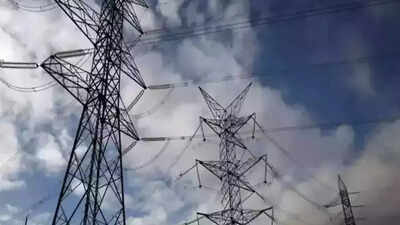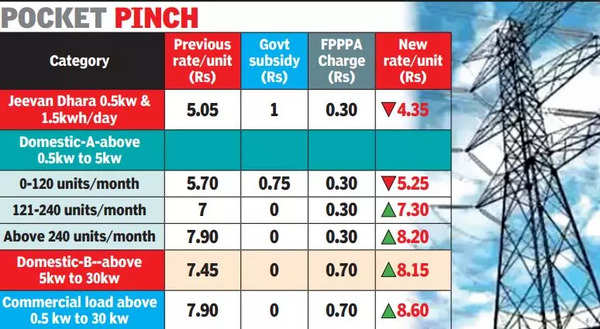- News
- City News
- guwahati News
- APDCL hikes power tariff to clear dues to source agencies
Trending Topics
APDCL hikes power tariff to clear dues to source agencies

Electricity consumers in Assam will have to pay 30 paise to 70 paise per unit more, except those who get a government subsidy, as the Assam Power Distribution Company Limited (APDCL) has adjusted its fuel and power purchase price adjustment (FPPPA) charge to clear its outstanding dues to the agencies from where it procures power to meet the electricity demand. This has come into effect from Thursday.
GUWAHATI: Electricity consumers in Assam will have to pay 30 paise to 70 paise per unit more, except those who get a government subsidy, as the Assam Power Distribution Company Limited (APDCL) has adjusted its fuel and power purchase price adjustment (FPPPA) charge to clear its outstanding dues to the agencies from where it procures power to meet the electricity demand. This has come into effect from Thursday.

The FPPPA charge is usually incurred by the power generating company, which is passed on to the distribution utility, who in turn recovers it from the consumers.
APDCL PRO Priyam Dutta in a statement said around 24% of total energy of the company is sourced from gas-based thermal power stations governed by gas prices as fixed by the ministry of petroleum and natural gas.
The power demand during the peak hours (5 pm to 10 pm) is about 1,850 MW, against which the Assam Power Generation Corporation Ltd (APGCL) produces only 260 MW on its own. The rest required power is procured from the central quota, private sectors and from energy exchange.
She said with the massive hike in gas prices, APDCL was burdened with additional Rs 1,212 crore during the first three quarters of 2022-23 financial years.
"But being sensitive to consumers, only Rs 253 crore was recovered from consumers during the year deferring the balance amount to subsequent periods. The Assam Electricity Regulatory Commission (Fuel and Power Purchase Price Adjustment) Regulation 2010 enables the recovery of additional charge on account of FPPPA charge from consumers," Dutta added.
She said considering the overall impact, the APDCL has decided to levy of FPPPA charge rationally in the form of 30 paise per unit from Jeevan Dhara-category consumers and low-tension domestic-A category of consumers and 70 paise per unit to other category of consumers.
Assam power minister Nandita Gorlosa said, "It is not the fact that we have forcefully done it. It is the need of the hour. AERC takes the decision to increase or decrease tariff after considering all the angles, including the possible impact on consumers."

The FPPPA charge is usually incurred by the power generating company, which is passed on to the distribution utility, who in turn recovers it from the consumers.
APDCL PRO Priyam Dutta in a statement said around 24% of total energy of the company is sourced from gas-based thermal power stations governed by gas prices as fixed by the ministry of petroleum and natural gas.
The power demand during the peak hours (5 pm to 10 pm) is about 1,850 MW, against which the Assam Power Generation Corporation Ltd (APGCL) produces only 260 MW on its own. The rest required power is procured from the central quota, private sectors and from energy exchange.
She said with the massive hike in gas prices, APDCL was burdened with additional Rs 1,212 crore during the first three quarters of 2022-23 financial years.
"But being sensitive to consumers, only Rs 253 crore was recovered from consumers during the year deferring the balance amount to subsequent periods. The Assam Electricity Regulatory Commission (Fuel and Power Purchase Price Adjustment) Regulation 2010 enables the recovery of additional charge on account of FPPPA charge from consumers," Dutta added.
She said considering the overall impact, the APDCL has decided to levy of FPPPA charge rationally in the form of 30 paise per unit from Jeevan Dhara-category consumers and low-tension domestic-A category of consumers and 70 paise per unit to other category of consumers.
Assam power minister Nandita Gorlosa said, "It is not the fact that we have forcefully done it. It is the need of the hour. AERC takes the decision to increase or decrease tariff after considering all the angles, including the possible impact on consumers."
Start a Conversation
FOLLOW US ON SOCIAL MEDIA
FacebookTwitterInstagramKOO APPYOUTUBE







